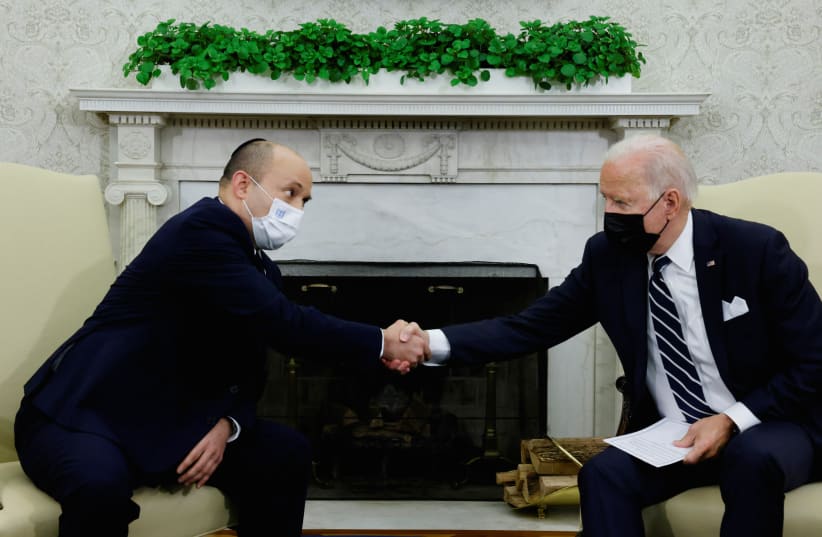The United States warned that Israel was harming prospects for a two-state solution by pursuing the advancement and approval of plans for 3,988 new West Bank settler homes.
“Israel’s program of expanding settlements deeply damages the prospect for a two-state solution,” Deputy State Department spokesperson Jalina Porter told reporters on Friday.
She spoke hours after Israel announced that its Higher Planning Council for Judea and Samaria would convene this Thursday for the first time since October, when it advanced and approved plans for 3,130 settler homes.
The council is slated to give its final approval on Thursday for 2,536 new settler homes. This includes the authorization of the Mitzpe Dani outpost as a new neighborhood of the Ma’aleh Mikhmas settlement. The council is also expected to allow the deposit of plans for 1,452 other homes.
Some 38% of the plans are for homes in isolated settlements.
According to N12, the Israeli media reported that the US had specifically asked Israel not to advance the plans with the White House, which sent a message to this effect to Israeli officials.
The White House message was conveyed in talks between at least three different American parties and senior Israeli officials in Israel. According to one source speaking with N12, the White House even conditioned President Joe Biden’s visit to Israel next month on the issue of plans for the 3,988 homes.
Porter told reporters that the Biden administration “strongly opposes the expansion of settlements, which exacerbates tensions and undermines trust between the parties.”
When asked about whether advancing the plans would impact Biden’s upcoming visit, Porter said, “I have nothing to comment about the president’s upcoming trip.”
The Biden Administration has been clear about its opposition to settlement activity, with US Ambassador to Israel Tom Nides calling such construction “stupid.” He believes that it will harm the two-state solution that was spoken of at a virtual event with the left-wing Israeli group Peace Now. However, both the Biden administration and Nides have been very supportive of Prime Minister Naftali Bennett and his coalition, which is made up of parties from the Left, Center and Right of the political map.
Advancement of the settler housing plans will likely shore up Bennett’s fragile coalition in advance of this Monday’s opening of the Knesset’s summer session. According to Walla, Jerusalem explained this to Washington.
To offset the anticipated anger by the US and other allies, Defense Minister Benny Gantz is expected to advance plans and issue retroactive authorizations for over 1,000 Palestinian homes in Area C of the West Bank, which is under both IDF military and civilian control.
Israel has been under pressure from the Biden administration to advance housing plans for Palestinians in Area C.
Yesha Council head David Elhayani and Samaria Regional Council head Yossi Dagan charged that the Higher Planning Council for Judea and Samaria had initially intended to advance plans for close to 6,000 settler units, but were told to cut 1,800-2,000 of them.
Elhayani accused the government of “giving a prize to terror” by cutting back on settler building plans precisely when the country was still reeling from Thursday’s terror attack in Elad.
Right-wing opposition politicians from Likud and the religious-Zionist Party had used the issue of a de-facto freeze to pressure right-wing parliamentarians in the coalition – such as those from Yamina and New Hope – to resign from the government.
In the aftermath of a pressure campaign, Yamina MK Idit Silman resigned from the coalition last month, bringing the coalition down to 60 out of 120 seats, causing it to lose its narrow majority.
Soon after Silman’s resignation, Yamina MK Nir Orbach issued an ultimatum in exchange for remaining in the coalition, which included convening the council to advance settler plans. He also insisted that West Bank outposts be hooked up to the electricity grid and that daycare subsidies for children of yeshiva students be restored.
The Justice Ministry has since issued an opinion, explaining there is no prohibition against connecting the fledgling unauthorized communities to the electricity grid.
Finance Minister Avigdor Liberman, who had cut the daycare subsidies, agreed to delay any action on the matter until 2024.
Orbach, who heads Yamina’s Knesset faction, thanked both Bennett and Gantz (Blue and White) for agreeing to his request.
“The Higher Planning Council is the air that allows the settlements to breathe,” Orbach said. “It is oxygen.”
He welcomed Bennett and Gantz’s decision to honor his request to convene the Higher Planning Council, adding that settlements make Israel “better and more secure.”
Orbach appeared to address US objections when he tweeted that “settlement construction should not be decided on by foreigners, senior as they may be.
“Anyone who does not recognize Israel’s right to build in Judea and Samaria, is welcome not to come,” Orbach said.
Interior Minister Ayelet Shaked (Yamina) welcomed the news of the council meeting, touting her role in the Mitzpe Dani authorization and noting that “construction in Judea and Samaria is basic, welcomed and obvious.”
Meretz MK Mossi Raz, whose party is in the coalition, charged that Bennett’s government had the most right-wing policies in the country’s history, but said that his party would remain in the coalition.
“We will keep [the government] because the alternative that awaits if it falls is worse,” Raz said.
Religious-Zionist Party head MK Bezalel Smotrich said that the government’s decision to announce the council meeting just one day after the terror attack in Elad was “an insulting and well-calculated public relations game at the expense of the settlements.”
Smotrich added that Shaked, Orbach and other Yamina members are engaged in “manipulations” to ensure their survival.
In the meantime, coalition member parties “Meretz and Ra’am present the real achievement – another step towards the establishment of a Palestinian terrorist state,” Smotrich said.
The left-wing group Americans for Peace Now called on the Biden administration to pressure Israel to refrain from advancing the plans, suggesting that it should go so far as withholding military aid and diplomatic support.
“American taxpayer foreign aid should not be used to undermine American foreign policy objectives,” Americans for Peace Now CEO Hadar Susskind said. “Whether it is financial aid, diplomatic support, or other leverage that the US routinely uses to advance its interests, this White House – like others in the past – has the tools to influence the government of Israel to stop the settlement madness.”
The plans for 2,536 settler homes that are scheduled to receive final approval include 761 units for Beitar Illit, 534 units for Shvuet Rachel, 364 for Dolev, 168 for Neria, 156 for Kiryat Arba, 136 for Givat Ze’ev, 114 for Ma’aleh Michmash, 106 for Tal Menashe, 92 for Zofim, 64 for Revava and 40 for Efrat.
The plans for 1,452 settler homes that are expected to be deposited include 500 units for the Elkana settlement, 286 units for Kedumim, 192 for Sha’are Tikvah, 170 for Immanuel, 110 for Mevo Horon, 90 for Dolev, 56 for Negahot, 32 for Nokdim and 16 for Ma’aleh Adumim.
Omri Nahmias and Lahav Harkov contributed to this report.

